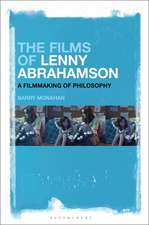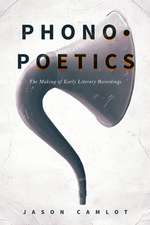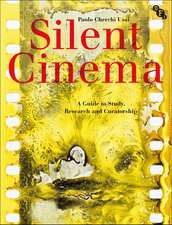The Science of Writing Characters: Using Psychology to Create Compelling Fictional Characters
Autor Kira-Anne Pelicanen Limba Engleză Paperback – 25 noi 2020
| Toate formatele și edițiile | Preț | Express |
|---|---|---|
| Paperback (1) | 159.99 lei 3-5 săpt. | +16.47 lei 5-11 zile |
| Bloomsbury Publishing – 25 noi 2020 | 159.99 lei 3-5 săpt. | +16.47 lei 5-11 zile |
| Hardback (1) | 496.71 lei 6-8 săpt. | |
| Bloomsbury Publishing – 25 noi 2020 | 496.71 lei 6-8 săpt. |
Preț: 159.99 lei
Nou
Puncte Express: 240
Preț estimativ în valută:
30.61€ • 32.04$ • 25.48£
30.61€ • 32.04$ • 25.48£
Carte disponibilă
Livrare economică 10-24 martie
Livrare express 22-28 februarie pentru 26.46 lei
Preluare comenzi: 021 569.72.76
Specificații
ISBN-13: 9781501357244
ISBN-10: 1501357247
Pagini: 200
Ilustrații: 66 bw illus
Dimensiuni: 152 x 229 x 16 mm
Greutate: 0.36 kg
Editura: Bloomsbury Publishing
Colecția Bloomsbury Academic
Locul publicării:New York, United States
ISBN-10: 1501357247
Pagini: 200
Ilustrații: 66 bw illus
Dimensiuni: 152 x 229 x 16 mm
Greutate: 0.36 kg
Editura: Bloomsbury Publishing
Colecția Bloomsbury Academic
Locul publicării:New York, United States
Caracteristici
Author is an experienced Hollywood screenwriter and a big promoter of her work, running workshops and seminars at places like London Screenwriters' Festival and at Raindance (London)
Notă biografică
Kira-Anne Pelican, PhD, is a writer, speaker and script consultant with 25 years of experience working in the British, American and Chinese film and television industries. She began her career assisting director Stanley Kubrick, took posts in visual effects production on The Matrix films, before working as a screenwriter, academic and script consultant. Her original screenplays have been optioned by the BBC, ITV and other independent producers and she has lectured on character development across the world.
Cuprins
1. Introduction2. The Dimensions of Character3. How Personality Shapes Dialogue4. Motivating Character5. When, Why and How Characters Transform6. The Emotional Journey7. Secondary Characters8. A Character WorkshopFootnotesGlossaryFilmographyBibliographyIndex
Recenzii
For every film-goer or TV viewer who has thought, "I could write a better script than this", Dr. Pelican shows them how to make their ideas real, attention-grabbing and above all truthful. The Science of Writing Characters is exactly the book we need now.
Kira-Anne Pelican's The Science of Writing Characters is a valuable tool to help screenwriter's think consciously, objectively, and methodically about aspects of character that for most of us are unconscious, intuitive, and automatic. It provides a structured psychological approach to developing film characters, using engaging examples from both classic and contemporary films and TV shows, such as Gone With the Wind and Game of Thrones. Dr. Pelican explains complex psychological ideas very clearly, and her book would be useful for screenwriting students and screenwriters at every level, as well as for faculty who are specifically interested in applying psychological theory to the process of character development in screenwriting.
Dr. Kira-Anne Pelican expands the scope and arena of the art and craft of screenwriting by delving more deeply into the psychology of characters. She is knowledgeable, insightful, clear, supportive of the writer, and welcomes the writer to embrace this method of deepening the craft.
No one I know has blended science with creativity like Kira-Anne Pelican. Any writer who ignores her research and fails to heed her advice risks being left in the distribution wilderness.
Good writing, as Kira-Anne Pelican notes, is the result of imagination, observation and instinct, an understanding of human behavior. Yet most writers fail. Early drafts are too often underdeveloped, as writing fast trumps writing deep. Pelican's book is a salutary reminder to those for whom it does not come naturally: that complex characters are more engaging, that if successfully drawn they take the reader or viewer on a compelling and emotional journey. The Science of Writing Characters is not prescriptive but is an excellent guide to what you can do to help your imagination create powerful, memorable and emotionally engaging characters.
The Science of Writing Characters is a godsend for those who wish to write cogent, exciting and distinctive screenplays. Most discussions of the craft focus on "plot points" and other such structural elements; comparatively few discuss character in any depth. Yet drama is at its essence an instrument with which a writer investigates the inner life of human beings, so this new book fills an important gap. Kira-Anne Pelican draws on extensive scientific research available and presents dimensions of personality (extroversion, agreeableness, neuroticism, conscientiousness, openness to experience), providing their historical origins and examples of them in fictional characters - and providing insight that goes way beyond the standard Myers-Briggs diagram. She then breaks these down further into their various subtleties, belief systems, capacity for transformation, emotional arcs, mental illness, and the intriguing "dark" and "light" triads of personality. Ms. Pelican does not present any kind of formula for creating character; instead, her book is a mind-opening tool chest for further investigation into the nature of humanity, a process that for a good writer never ends.
The Science of Writing Characters is an artful bridge between science and craft, thorough in both areas, and imaginative and insightful in connecting the two. The book's introduction invites you to use it as you need: as a guide, as a toolbox, or as an academic core text. But however you will end up using it, you will feel supported every step of the way.
There is much here that is interesting and helpful, and all of it is thoroughly grounded in research. The book is essential for any writer ... It is a remarkably thorough tool kit for a writer aiming to explore the mysteries that lie within all of us, and explore those mysteries through the medium of drama.
Kira-Anne Pelican's The Science of Writing Characters is a valuable tool to help screenwriter's think consciously, objectively, and methodically about aspects of character that for most of us are unconscious, intuitive, and automatic. It provides a structured psychological approach to developing film characters, using engaging examples from both classic and contemporary films and TV shows, such as Gone With the Wind and Game of Thrones. Dr. Pelican explains complex psychological ideas very clearly, and her book would be useful for screenwriting students and screenwriters at every level, as well as for faculty who are specifically interested in applying psychological theory to the process of character development in screenwriting.
Dr. Kira-Anne Pelican expands the scope and arena of the art and craft of screenwriting by delving more deeply into the psychology of characters. She is knowledgeable, insightful, clear, supportive of the writer, and welcomes the writer to embrace this method of deepening the craft.
No one I know has blended science with creativity like Kira-Anne Pelican. Any writer who ignores her research and fails to heed her advice risks being left in the distribution wilderness.
Good writing, as Kira-Anne Pelican notes, is the result of imagination, observation and instinct, an understanding of human behavior. Yet most writers fail. Early drafts are too often underdeveloped, as writing fast trumps writing deep. Pelican's book is a salutary reminder to those for whom it does not come naturally: that complex characters are more engaging, that if successfully drawn they take the reader or viewer on a compelling and emotional journey. The Science of Writing Characters is not prescriptive but is an excellent guide to what you can do to help your imagination create powerful, memorable and emotionally engaging characters.
The Science of Writing Characters is a godsend for those who wish to write cogent, exciting and distinctive screenplays. Most discussions of the craft focus on "plot points" and other such structural elements; comparatively few discuss character in any depth. Yet drama is at its essence an instrument with which a writer investigates the inner life of human beings, so this new book fills an important gap. Kira-Anne Pelican draws on extensive scientific research available and presents dimensions of personality (extroversion, agreeableness, neuroticism, conscientiousness, openness to experience), providing their historical origins and examples of them in fictional characters - and providing insight that goes way beyond the standard Myers-Briggs diagram. She then breaks these down further into their various subtleties, belief systems, capacity for transformation, emotional arcs, mental illness, and the intriguing "dark" and "light" triads of personality. Ms. Pelican does not present any kind of formula for creating character; instead, her book is a mind-opening tool chest for further investigation into the nature of humanity, a process that for a good writer never ends.
The Science of Writing Characters is an artful bridge between science and craft, thorough in both areas, and imaginative and insightful in connecting the two. The book's introduction invites you to use it as you need: as a guide, as a toolbox, or as an academic core text. But however you will end up using it, you will feel supported every step of the way.
There is much here that is interesting and helpful, and all of it is thoroughly grounded in research. The book is essential for any writer ... It is a remarkably thorough tool kit for a writer aiming to explore the mysteries that lie within all of us, and explore those mysteries through the medium of drama.
























